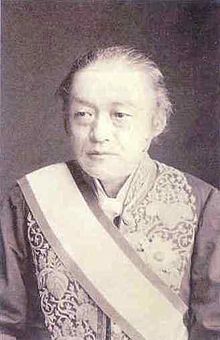Iwakura Tomomi
Iwakura Tomomi ( Japanese 岩 倉 具 視 ; born September 15, 1825 in Kyōto , † July 20, 1883 in Tōkyō ) was a Japanese courtier and politician of the late Tokugawa and early Meiji periods .
Life
Iwakura Tomomi was born as the second child of the court nobleman Horikawa Yasuchika and was adopted by Iwakura Tomoyasu .
At the imperial court he worked in the decline phase of the shogunate . But he fell in the eighth month of 1862 a. a. because of his involvement in the marriage of Princess Kazu no Miya to Tokugawa Iemochi in disgrace and temporarily lost his power. Through his contact with low-ranking priests at some of the higher-ranking shrines in Kyoto, however, he remained well informed about the political situation.
In January 1867, Iwakura allegedly murdered the emperor Kōmei because he responded to the shogunate's policy of rapprochement. In the same year he propagated together with several scholars of the Kokugaku (including Gonda Naosuke and Ochiai Naoaki ) the integration of Shinto elements in the anti- Bakufu movement and in this way participated in the Meiji Restoration . So he received the post of Udaijin and Foreign Minister (( 卿 , Gaimu-kyō ) in the Meiji government in 1871 .
From 1871 to 1873, Iwakura led the Iwakura mission named after him to Europe and the United States , the aim of which was to dissolve the Unequal Treaties that were imposed on Japan and to discover Europe for the Japanese. The first goal was not achieved, but he brought a lot of new technology back to Japan.
On December 18, 1882 Iwakura received a high-ranking post in the Kunaishō , from which he tried to have several articles on the institutional entanglement of Shintō and Tennō in the Meiji constitution .
Web links
Individual evidence
- ↑ a b c d Akimoto Nobuhide: "Iwakura Tomomi" . In: Encyclopedia of Shinto. Kokugaku-in , April 12, 2006 (English)
- ^ David Bergamini: Japan's Imperial Conspiracy. Heinemann, London 1971, ISBN 0-434-06690-7 , p. 433.
| personal data | |
|---|---|
| SURNAME | Iwakura, Tomomi |
| BRIEF DESCRIPTION | Japanese statesman |
| DATE OF BIRTH | September 15, 1825 |
| PLACE OF BIRTH | Kyoto |
| DATE OF DEATH | July 20, 1883 |
| Place of death | Tokyo |

